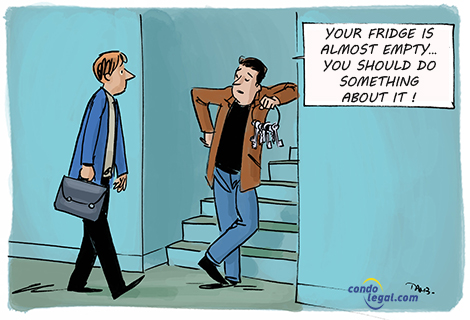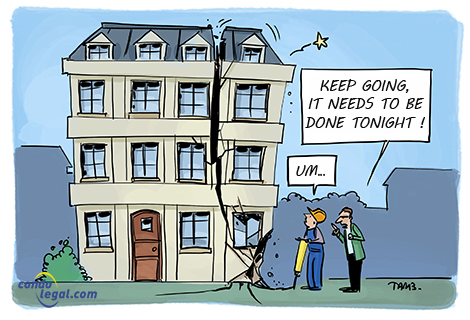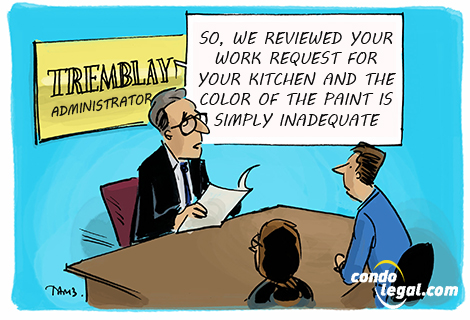27 Articles
Lorsque la partie privative est louée et qu'il y a nécessité d'exécuter des travaux à l'intérieur de celle-ci, le syndicat doit donner au locataire les préavis prévus aux articles 1922 et 1931 du Code civil du Québec (C.c.Q.)....

Section 7 of the Charter of human rights and freedoms guarantees the inviolability of a person's home. In principle, no one may have access to a co-owner's apartment without his or her consent; however, it has been rightfully ruled that this rule is not absolute and this is why most declarations of co-ownership specify that a co-owner, a lessee (tenant) or any other occupant of the immovable must leave at all times a duplicate set of keys to the board…...

The contingency fund is set up on the basis of forward planning limited to certain work namely that which the purpose is the preservation of the common portions; thus, this collective saving allows to finance the execution of work allowing the rehabilitation of the common portions as well as the common portions for restricted use. The contingency fund must be used to pay the cost of very specific work namely that related to major repairs or the replacement of the common portions of the immovable. ...

The contingency fund constitutes first and foremost a prevention tool. The desire to incite co-owners to anticipate the completion of important work is not news. Prior to the entry into effect of the Civil Code of Québec in 1994, it was a frequent occurrence for a co-ownership (condominium) to have a reserve fund even though the Civil Code of Lower Canada was silent on this question; the majority of declarations of co-ownership contained provisions on…...

The work to be done in the common portions is subject to rules that it is useful to know in detail. The syndicate of co-ownership acts in this matter through its two bodies, the board of directors and the meeting of the co-owners. It is the responsibility of the board of directors to analyze the scope and budget of the work and to organize, when required by law, a general assembly of co-owners (annual or special meeting) to vote by…...

Many co-owners carry out work to renovate their apartments, after moving in, to make them more in tune with their tastes and personalities. Redecorating the premises and integrating new equipment,such as in the kitchen or the bathroom, is a legitimate endeavor. To know the rules to be respected, it is better to refer to the declaration of co-ownership. This is how you will have to check, before a project can begin, whether the work in…...

Many co-owners mistakenly believe they have free rein when they want to relocate their kitchen, renovate electrical or plumbing installations, or demolish a wall in their residential unit. However, the by-laws of the immovable (declaration of co-ownership ) generally include strict guidelines, limitations, and even prohibitions concerning work that could be undertaken in a private portiob. This is why such work often requires prior approval from the board of directors. This decision-making body has the power…...

In a co-ownership setting, certain renovations or modifications made by a co-owner may impact the common portions, necessitating specific procedures and approvals. When the work of a co-owner has an impact on the common portions, the latter must obtain authorization from the meeting of the co-owners to have it undertaken, even if the work is carried out in his private portion. This authorization requires a vote, the majority of which is greater than that required for the…...

The directors of a co-ownershipmay, eventually, be required to enter a co-owner’s private portion. Article 1066 of the Civil Code of Québec obliges the co-owner, as well as their tenant or any other occupant, to accept work within their private portion. This applies particularly to urgent or conservation work aimed at ensuring the longevity of the building. It also includes necessary preliminary inspections for the preservation of the building and the safety of the occupants. Therefore, every co-owner…...

The syndicate's right of access to a private portion must be exercised in a reasonable manner. Work to be undertaken by the latter, even when justified, requires that the occupants of the apartment be notified before the work starts. Thus, it will be necessary to warn them in advance so that they can prepare accordingly. In any case, the syndicate must generally respect a notice period, which may vary depending on whether it concerns a co-owner, a tenant…...
